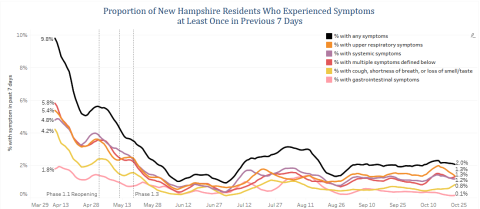Emphasis on Social Distancing Recedes in NH but Most Still Not Leaving Home to Work or Socialize 6/16/2020
Granite Staters continue to prioritize social distancing over reopening the economy, but zeal for social distancing has waned over the past two months. Nearly all groups prioritize social distancing less than they did in early May, but Democrats and women continue to place greater emphasis on it than Republicans and men. Granite Staters are leaving their homes more frequently than in April or May, but most did not leave their home even once in the previous seven days to go to work or to socialize with those outside their household. Stress related to work and finances also continues to decline, as young people in particular are feeling considerably less stress about their household finances than in early May.
Click here or the image below for results
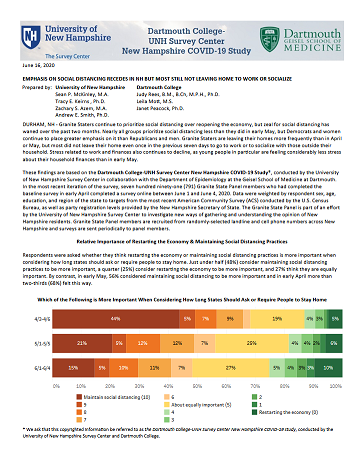
COVID-19 Stress Continues to Decline Among NH Residents 6/15/2020
Stress among New Hampshire residents related to the COVID-19 pandemic continues to decline. Those under thirty, women, and registered Democrats remain more stressed than others. Symptoms of anxiety and depression have also declined, most notably among young people, but remain higher than under typical circumstances. Granite Staters continue to feel considerable stress concerning their family's health and emotional well-being and the care and education of their children, but relatively few are concerned about their own health, their finances or job, or being able to access food or supplies. As the weather improves and restrictions ease, nearly half of residents now report exercising and spending time outdoors at least five days a week.
Click here or the image below for results
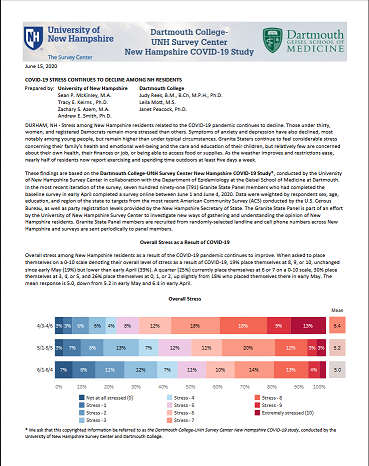
Despite Increased Testing Capacity in NH, Demand for Tests Wanes Among Granite Staters 6/10/2020
Despite increasing testing capacity in the state, demand for testing among New Hampshire residents has declined considerably since May. Half of Granite Staters want or have already had an antibody test to determine if they have had COVID-19, down from more than three-quarters who wanted one in early May. Meanwhile, only one in seven residents want a test to determine if they currently have COVID-19. Many of those who would like these tests mention not knowing where to go to get a test, a lack of symptoms, and concerns about insurance or payment as reasons they have not yet been tested. One in six residents think it is very or somewhat likely they have or already had COVID-19, slightly lower than in early May.
Click here or the image below for results
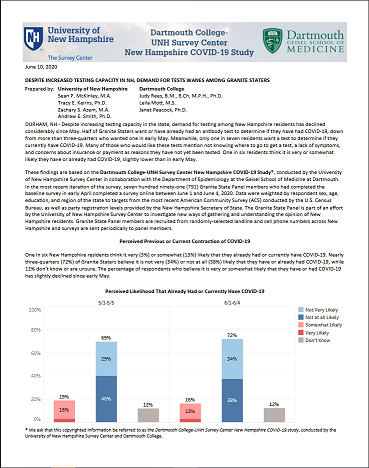
One in Five NH Residents Believe They Likely Have or Had COVID-19; Demand For Antibody Testing High - 5/26/2020
One-fifth of New Hampshire residents believe it is very or somewhat likely that they have COVID-19 or had it in the past. Those aged 30 to 44 and those working in high-risk jobs are more likely than others to believe this. A quarter of Granite Staters want to be tested to determine whether they currently have COVID-19, many of whom say they haven't been tested due to a lack serious symptoms, the cost of the tests, or not knowing where to go or how to get a test. While only a quarter would like a test to see if they currently have COVID-19, more than three-quarters want to receive an antibody test to determine if they have had COVID-19 in the past.
Click here or the image below for results
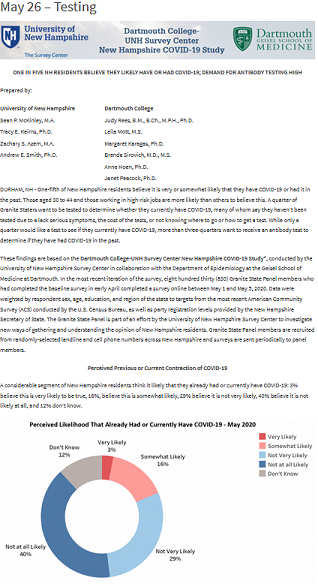
COVID-19 Stress Falls Among Granite Staters But Pandemic Weighs Heavily on Mental Health of Young People - 5/18/2020
Stress among New Hampshire residents related to the COVID-19 pandemic has declined compared to early April. Few Granite Staters report feeling considerable stress over their personal health or access to food or supplies, but many express significant concern for their family's health and emotional well-being. Those under the age of thirty are most likely to report experiencing these feelings and report higher levels of overall stress. Despite the pandemic, most residents report exercising and spending time outdoors at least three days a week. Those who do these things five or more days a week report lower overall stress than others.
Click here or the image below for results
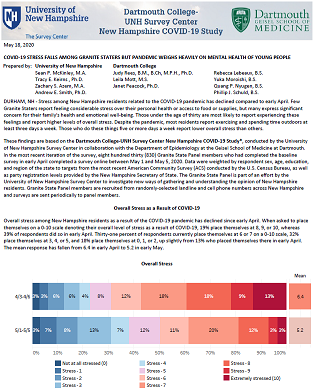
Granite Staters Continue to Prioritize Social Distancing, but Perceived Importance of Restarting Economy Grows - 5/11/2020
A majority of New Hampshire residents continue to believe that maintaining social distancing practices is more important than restarting the economy, but a growing number of people consider both to be important. Nearly all groups in the state consider restarting the economy to be more important than they did in early April, but significant differences remain based on gender, partisanship, and media consumption. More than a third of NH workers have lost a job or had their hours reduced as a result of the COVID-19 pandemic, largely unchanged since early April, but measures of stress concerning employment and the economy have improved. Nearly a quarter of residents left their home for work in the previous seven days but most residents are still leaving home for groceries or supplies at least once a week.
Click here or the image below for results
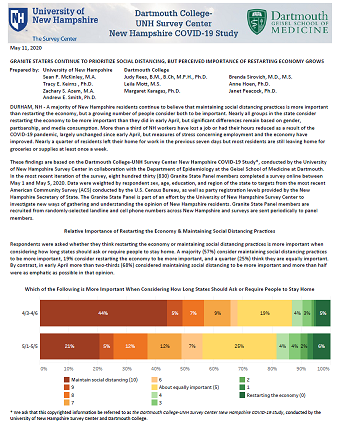
Geisel and UNH Share Updates from Statewide COVID-19 Survey - 5/6/2020
A month ago, as New Hampshire entered the third week of its “stay-at-home” order, 9.8% of New Hampshire residents had experienced any symptoms during the previous seven days; currently, 4.7% have had symptoms in the past seven days. Only 1.5% have experienced cough, shortness of breath or loss of sense of smell or taste in the past seven days, down from 4.2% four weeks ago. Overall, just over one-third (35%) of Granite Staters have experienced any symptoms during the past eight weeks. Click here to read more about the survey.
These charts will be updated regularly. Click here or the image below for the most recent symptom data.
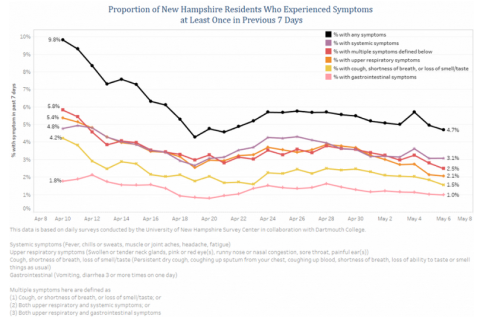
Large Numbers of NH Workers Affected By COVID-19; Most Prioritize Social Distancing Over Restarting Economy - 4/15/2020
One-third of working Granite Staters say they have lost a job or had their work hours reduced as a result of the COVID-19 pandemic. However, more than half of New Hampshire households still have at least one member who left home for work in the preceding seven days. Despite these economic hardships, when asked to choose between restarting the economy and maintaining social distancing, a large majority of New Hampshire residents prioritize social distancing, even those who have lost a job or work hours. Young
people and those with a high school education or less are more likely to have lost a job or work hours and express high levels of financial stress. Older and more educated people are less stressed, less likely to have lost a job or work hours, and are more likely to be working remotely.
Click here or the image below for results
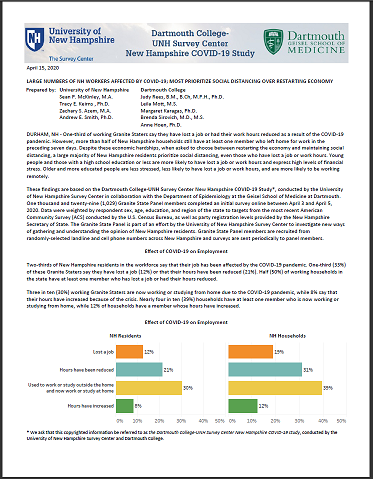
Geisel and UNH Share Initial Results from Statewide COVID-19 Survey - 4/9/2020
Researchers at Dartmouth’s Geisel School of Medicine have published the first data from a COVID-19 community survey launched Friday in collaboration with the University of New Hampshire (UNH) Survey Center.
Early results indicate that just over half of the 1,029 New Hampshire households surveyed (and 68% of individuals within those households) had been completely symptom-free during the past four weeks. The most commonly reported symptoms were runny nose/nasal congestion (27 percent of households), sore throat (15 percent), persistent dry cough (9 percent), and fever (8 percent). Click here to read more about the survey.
Click here or the image below for interactive results:

